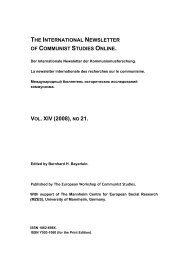11RXNdQ
11RXNdQ
11RXNdQ
You also want an ePaper? Increase the reach of your titles
YUMPU automatically turns print PDFs into web optimized ePapers that Google loves.
essay is remarkable in emphasizing the systematic basis of colonialism. In generalizing<br />
his account of Algeria through the claim of his title, Sartre did not mean that there was a<br />
single colonial system everywhere and at all times, but rather that colonialism<br />
represented a deliberate and systematic form of exploitation that could be analysed as<br />
such. Fanon took this a stage further, so that Sartre’s Manichaean system provided the<br />
fundamental model for his much more abstract account of colonialism and anti-colonial<br />
resistance in The Wretched of the Earth. Fanon, as Homi Bhabha has observed, ‘rarely<br />
historicises the colonial experience’ (Bhabha 1986: xiii). This was a deliberate political<br />
strategy: it was the abstracted universalism of Fanon’s analysis that enabled The<br />
Wretched of the Earth to become, in Stuart Hall’s words, ‘the Bible of decolonisation’.<br />
VI<br />
By combining his pursuit of ontology with one of violent resistance to power, dominant<br />
and exploitative, Sartre set up the dialectical basis for anti-colonial struggle, followed by<br />
Fanon, which was characterized by the coincidence of systematic and existential<br />
accounts. Just as The Wretched of the Earth begins with a general account of the colonial<br />
world but ends with the particularity of case histories of individual patients who had<br />
suffered psychological traumas during the Algerian War of Independence, so Sartre’s<br />
emphasis on the systematic basis of colonialism was not made at the expense of his<br />
earlier affirmation of the significance and authenticity of individual subjective<br />
experience, and of its value as a determinant of political action. The conflictual dialectic<br />
of subject and object in Sartre’s phenomenology formed the theoretical basis for his<br />
Marxism which started out not from the determining material conditions of the world but<br />
from the subject as agent, acting his or her choices out in the conditions of history. The<br />
Critique of Dialectical Reason represents Sartre’s attempt to resolve this dialectic, to<br />
combine his ethics of individual freedom, of responsibility and authenticity with the<br />
larger processes of history. In the section entitled ‘Racism and Colonialism as Praxis and<br />
Process’, the inspiration for the opening chapter of The Wretched of the Earth, Sartre was<br />
the first (and last) European Marxist theorist to develop a theory of history in which<br />
colonialism, and the endemic violence of the colonial regime, was a major component,<br />
and which gave a significant role to anti-colonial resistance (Young 1990). Sartre’s<br />
account of historical determinism remains unique in the way in which he combined<br />
subjectivity, the consciousness of acting as an historical agent, with the totality of<br />
determining historical processes. As Fredric Jameson describes it, such a conjuncture in<br />
Sartre involves not ‘a reconciliation of contraries, but rather … a kind of unified field<br />
theory in which two wholly different ontological phenomena can share a common set of<br />
equations and be expressed in a single linguistic or terminological system’ (Jameson<br />
1971:208). This constitutes an accurate description not only of Sartre, but also of Fanon’s<br />
work, and through him of postcolonial theory in general. Deeply drawn to Sartre by the<br />
latter’s public commitment to anticolonial politics, Fanon was also attracted to Sartre’s<br />
position at a more philosophical level because of its existentialist articulation of objective<br />
materialist history with the subjective experience of its operations. It is through Sartre<br />
and Fanon that postcolonial theory acts out its distinctive combination of anti-colonial




